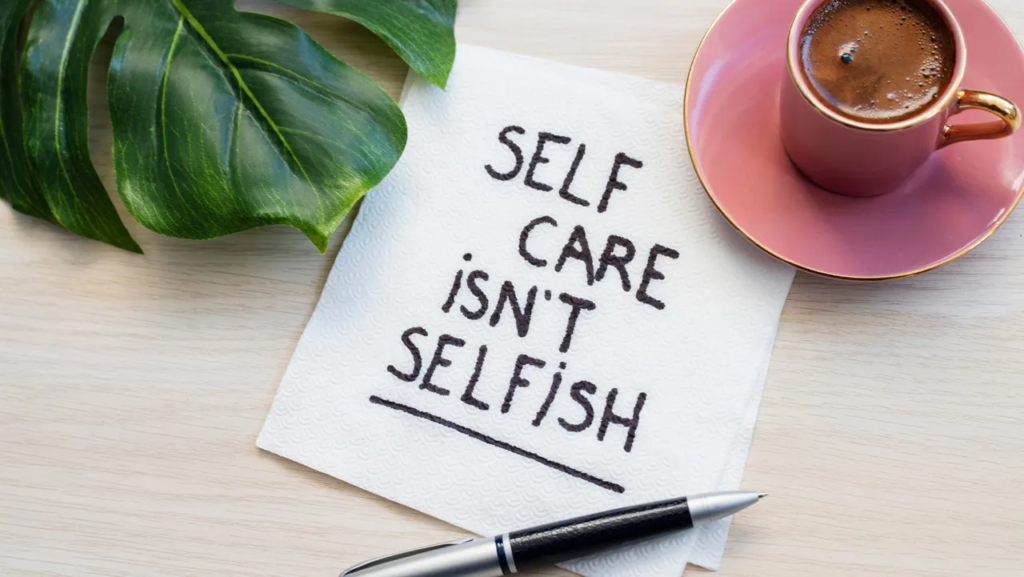How to Hack Self-Care for 2023
Originally published on the I Earned It blog.

7 Tips for Making Self-Care a Priority This Year
Self-care is taking care of your mental and physical health and well-being. According to the World Health Organization, self-care is important because it promotes health, prevents disease, and helps manage illness. Here are our seven tips for practicing self-care this year and showing yourself a little extra love.
1. Prioritize sleep
Prioritizing sleep is an easy way to jump into self-care, as it benefits both your mental and physical health. According to Everyday Health, sleep helps your immune system fight off infections, keeps stress in check, and helps your brain regulate emotions, stay focused and make decisions. In addition, getting a good night’s sleep will set you up for success for the rest of your day. Here are a few tips for getting a good rest:
- Listen to your body and sleep when you feel tired.
- Create a bedtime routine to get your brain used to going to sleep at a certain time.
- Make your sleep comfortable. For example, if you wake up too early because the sun comes streaming through your window, use blackout curtains to maximize your sleep potential.
- Make bedtime relaxing by avoiding stressors before you get in bed. For example, avoid activities that increase your cortisol levels, like drinking caffeine or using your phone.
2. Recognize when you’re stressed.
Stress can cause a plethora of problems for your mental and physical well-being. Community Access Network states, “Stress indicates a boundary or limit in your physical or mental/emotional abilities that will negatively impact your overall wellness if continually breached.” Understanding stress and knowing how to recognize stress in yourself can help you practice self-care. Ask yourself these questions to see if you’re stressed:
- How am I feeling emotionally today?
- How am I feeling psychically today?
- Do I have too much on my plate?
- Have I had time for myself lately?
- Do I have the ability to relax right now?
These questions can help you gauge if you are feeling stressed and to what degree, so you can find a way to stop stress.
3. Remember your positive affirmations.
Often, you hear about having a voice in your head telling you you aren’t good enough, but did you know you can control that voice? And it can tell you you are good enough. A study by the American Psychological Association suggests that self-talk can be used as a regulatory mechanism, and positive self-talk can lead to happier thoughts and feelings. Using self-talk is a great way to bring self-love into your self-care routine. Tips for being kinder to yourself:
- When the voice in your head is being mean, stop it and tell yourself you are enough.
- When you do a good job on something, tell yourself, “I’m proud, and I’ve done a good job!”
- Look in the mirror every morning and pay yourself a compliment.
4. Exercise regularly
Amherst College states, “Physical activity stimulates brain chemicals that leave you feeling happier and more relaxed, providing an emotional lift and reducing stress.” So not only is exercise good for your physical health, but it can also boost your mood. Check out these fun and easy ways to get moving:
- Have a walking meeting. If you’re on the phone or video chatting, use the time to be active.
- Move while you watch TV. Instead of becoming a couch potato, get up and get moving while you binge-watch.
- Use a standing desk. Standing while working is a great way to get your blood flowing.
- Incorporate movement into everyday tasks. Try doing squats while you brush your teeth or wall push-ups when cooking.
5. Focus on your diet
At some point, you’ve probably heard someone say, “the way to a person’s heart is through their stomach.” And it’s true: show yourself extra love, by starting with your diet. The National Institute of Mental Health says, “A balanced diet and plenty of water can improve your energy and focus throughout the day.” So eat healthy, regular meals and drink plenty of water to focus on your diet.
- Don’t skip meals. Eat three meals a day to keep your energy up.
- Remember the food pyramid. Try to incorporate foods from each category of the food pyramid for balanced nutrition.
- Drink plenty of water. Drink eight glasses of water a day to stay hydrated.
6. Stay connected
The University of Michigan suggests social connectedness can help lower anxiety and depression levels and promote empathy and stronger bonds in relationships. We love these ways to increase your social connection:
- Check-in with your family. Text or call a family member just to see how they’re doing.
- Schedule time to see a friend. Plan time to hang out with friends. Bonus points if you do something relaxing.
- Meet new people. Take a class or join a group to make new friends.
7. Take time for yourself.
Sometimes you just need alone time to decompress and shed off the weight of the world. The Kashmir Observer says the benefits of “Me Time” include reducing tension, increasing productivity and understanding yourself better. Here are a few ideas for Me Time:
- Take a tech break. Turn off your phone and tv and have time to be with your thoughts.
- Spend time outdoors. Take the dog for a walk, ride your bike or enjoy your lunch on the lawn.
- Have a mini spa day. Pamper yourself by doing a home mani-pedi and taking a relaxing bubble bath.
- Take yourself out. Go to your favorite restaurant by yourself and enjoy your own company.
- Treat yourself. Buy yourself something you usually wouldn’t, like an ice cream or that pair of shoes you’ve been eyeing on Amazon.